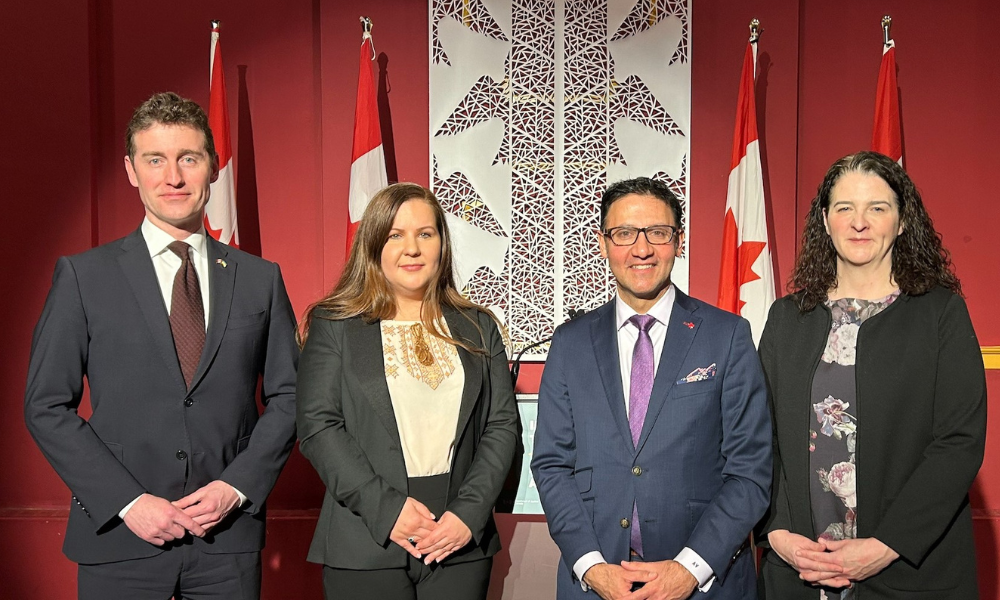
Pro Bono Ontario and the feds made the announcement Tuesday

On Tuesday, Department of Justice Canada announced new legal aid funding for Ukrainian nationals who have fled the Russian invasion and are living in Canada.
Justice Canada will give $475,788 to Pro Bono Ontario’s (PBO) Ukrainian Refugee Legal Relief Initiative over the next three years. With the new funding, PBO will expand and offer services to Ukrainian nationals who have settled anywhere in Canada, not just in Ontario. Minister of Justice and Attorney General of Canada Arif Virani and PBO executive director Kirsti Mathers McHenry made the announcement Tuesday morning at the St. Volodymyr Institute on Spadina Avenue in Toronto. They were joined by Member of Parliament for Etobicoke Centre Yvan Baker and Olha Senyshyn, an immigration and refugee lawyer.
PBO operates a telephone hotline to provide legal information and connect callers with lawyers. In June 2022, PBO launched the Ukrainian Refugee Legal Relief Initiative to provide legal help in English, French, or Ukrainian. The hotline operates from 12 p.m. to 5 p.m., Monday to Friday.
According to Mathers McHenry, most of the legal inquiries PBO receives relate to work and study permits, extension of stays in Canada, refugee claims, helping family members come to Canada, and finding a permanent path to residency. Ukrainian nationals also call the hotline about housing, employment, family law, and consumer protection issues. She says that, like PBO’s other clients, Ukrainian nationals tend to return to the hotline as their needs evolve.
Mathers McHenry says the hotline can also connect clients to social and religious services and settlement organizations. So far, PBO has provided 1,229 consultations to 882 clients. She says the PBO has been working with the Ukrainian Bar Association, which has chipped in with its support and expertise.
“For many people, the idea that a hotline can have a significant impact is sometimes a bit hard to comprehend, says Mathers McHenry. “But what we know from our programming, generally, is that the impact of a person being able to reach a lawyer and talk to them about their situation is significant.”
“We know from conversations with our clients every day that that initial conversation that sets out their legal rights and options provides a measurable relief, particularly to people facing difficult problems.”
There are 1.3 million people of Ukrainian descent in Canada, which makes it the largest Ukrainian diaspora community in the world. In the wake of the Russian invasion, the federal government implemented the Canada-Ukraine Authorization for Emergency Travel (CUAET), which gives Ukrainians and their family members temporary resident status and allows them to work and live in Canada. 221,231 Ukrainians came to Canada under the CUAET between March 17, 2022, and January 27, 2024. Of the 1,189,320 applications received during this period, Canada has approved 958,190.
At Tuesday's announcement, the justice minister noted that his path to Canada mirrored the many Ukrainians who have come in the last two years. Virani’s family fled Uganda and came to Canada as refugees more than 50 years ago.
“It was stressful and challenging – all the more so when you're navigating a new environment with unfamiliar and complex legal processes,” he says. “So, it is our job as a government to help. It is my job as Minister of Justice to help. One part of this includes providing legal support to Ukrainian nationals who have already arrived in Canada, as well as those looking to come here, as they seek safety for themselves and for their loved ones.”
“Ukrainians fleeing persecution need to know where to turn for help and for information as they settle into an unfamiliar setting – whether it's finding a home, finding a job, accessing health care, organizing their finances, or something as simple as sending their kids to school. This means having access to legal supports that are easy to navigate, that help them understand their rights and help them understand the law in this country.”